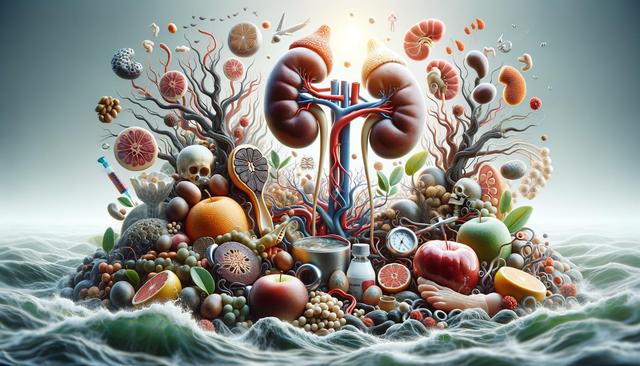Recognizing the Early Signs of Kidney Disease
Kidney disease often progresses silently, showing few symptoms in the early stages. Early detection is crucial, especially as the condition advances toward stage 4 chronic kidney disease, where intervention becomes more urgent. Common early warning signs include changes in urination patterns, such as increased frequency at night, foamy urine, or difficulty urinating. Swelling in the ankles, feet, or hands can also signal the kidneys are not eliminating excess fluid effectively. Additionally, persistent fatigue, difficulty concentrating, and unexplained shortness of breath may indicate reduced kidney function. Identifying these symptoms early can allow for timely medical evaluation and potential adjustment of lifestyle or treatment plans.
Other signs that should prompt further medical investigation include:
- Persistent itching, which may be due to a buildup of waste in the blood
- Metallic taste in the mouth or ammonia breath
- Nausea and vomiting not linked to other causes
- Loss of appetite or unintentional weight loss
People at higher risk, such as those with diabetes or high blood pressure, should be particularly vigilant. Monitoring kidney health through routine blood and urine tests is essential for early intervention.
The Link Between Chronic Conditions and Kidney Health
Chronic illnesses like diabetes and hypertension are leading contributors to kidney disease. These conditions damage kidney blood vessels over time, impairing their filtering ability. Understanding the connections between these chronic diseases and kidney function can help individuals manage their overall health more effectively. Following a targeted diet for diabetes high blood pressure and kidney disease is one strategy to support kidney health and slow progression.
This type of diet typically includes:
- Reducing sodium to help control blood pressure
- Limiting protein intake to reduce kidney workload
- Managing blood sugar levels through low glycemic foods
- Staying hydrated with kidney-friendly fluids
Working closely with healthcare providers, including dietitians, enables patients to tailor their nutrition plans to individual health needs. Monitoring and managing these chronic conditions early can significantly reduce the risk of reaching stage 4 CKD.
Understanding Stage 4 CKD and Its Implications
Stage 4 CKD is characterized by a significant reduction in kidney function, typically measured by an estimated glomerular filtration rate (eGFR) between 15 and 29 mL/min. At this point, symptoms often become more apparent and may include muscle cramps, swelling, and severe fatigue. The risk of complications, such as anemia, bone disease, and cardiovascular issues, also increases. Understanding these implications helps patients and caregivers prepare for potential changes in care.
While dialysis is commonly associated with advanced kidney disease, it is not the only option. Alternatives to dialysis may include:
- Conservative management focusing on symptom relief and quality of life
- Kidney transplant evaluation for eligible individuals
- Medication adjustments to manage complications
- Dietary interventions tailored to reduce kidney strain
Each individual’s treatment path depends on their overall health, preferences, and the progression of their condition. Engaging in open discussions with nephrologists can help clarify which strategies are most appropriate.
Hydration and Kidney Health
Proper hydration plays a vital role in supporting kidney function. For those looking to maintain kidney health or slow the progression of kidney disease, knowing what to drink to keep kidneys healthy is essential. Water is generally the most recommended fluid, as it helps flush out toxins and maintain a healthy balance of electrolytes. However, people with stage 4 CKD may need to monitor their fluid intake more closely to avoid fluid overload.
When considering what is the best thing to drink for your kidneys, the answer can vary based on individual health conditions. In general, some kidney-friendly options include:
- Plain water
- Herbal teas (without added sugar or potassium)
- Cranberry juice in moderation (may help prevent infections)
- Low-potassium fruit juices like apple or grape juice
Avoiding sugary beverages, high-sodium broths, and drinks high in phosphorus or potassium is also important. Consulting with a healthcare provider can ensure that fluid choices align with your current kidney function and overall dietary needs.
Proactive Lifestyle Changes for Kidney Support
Making proactive lifestyle changes can greatly influence the trajectory of kidney disease. Beyond medical treatment, daily habits play an important role in preserving kidney function. These changes include adopting a diet for diabetes high blood pressure and kidney disease, maintaining regular physical activity, and avoiding harmful substances like tobacco and excessive alcohol. Reducing stress, getting adequate sleep, and keeping regular medical appointments are also vital in managing CKD.
Helpful lifestyle strategies include:
- Monitoring blood pressure and keeping it within a target range
- Controlling blood sugar through diet and medication, if needed
- Reading food labels to manage sodium, phosphorus, and potassium intake
- Using medications only as prescribed to avoid kidney-damaging side effects
These efforts, while sometimes requiring significant adjustments, can lead to improved health outcomes and a better quality of life. Collaborating with a care team ensures that changes are effective and sustainable over time.
Conclusion: Taking Action with Awareness
Recognizing the early signs of kidney disease and understanding the broader implications of stage 4 CKD are the first steps in managing this serious condition. With increased awareness, individuals can take meaningful action through lifestyle changes, informed hydration choices, and collaborative care planning. Whether exploring alternatives to dialysis or simply seeking what to drink to keep kidneys healthy, each decision contributes to improved well-being. By staying proactive and informed, those facing kidney disease can better navigate their options and maintain a focus on long-term health.




Leave a Reply